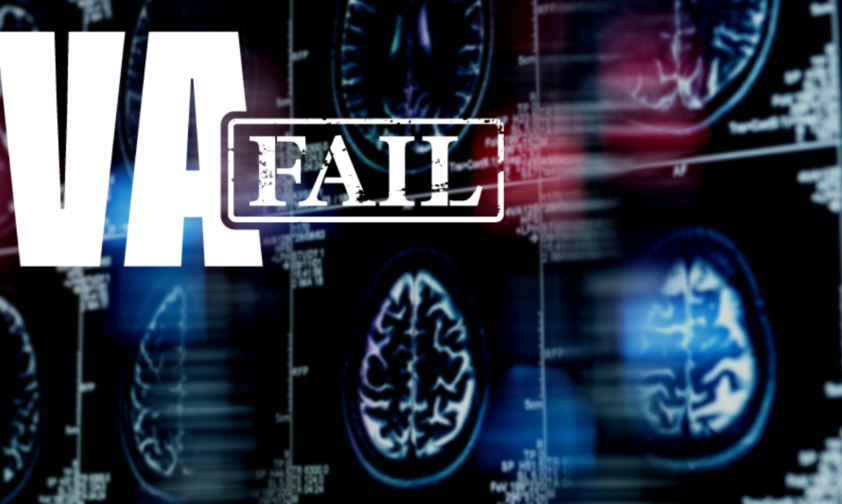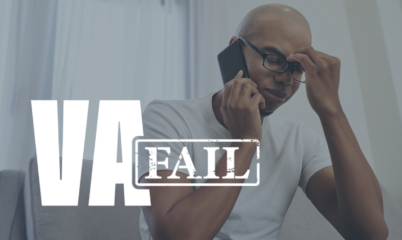
#VAFail: Veterans’ brain injuries misdiagnosed, leaving them without needed care and benefits
Veterans face unique challenges when it comes to their physical and mental health care. The dangers they are exposed to, both in training and combat, put them at risk of neurological injuries, including traumatic brain injuries.
It’s all the more important that they have access to quality care at home to properly treat brain injuries and receive their earned benefits for those injuries.
But a slew of misdiagnoses has prevented veterans in Wisconsin from accessing either.
Veteran accused of seeking ‘secondary gain’ for brain injuries
Former Black Hawk helicopter pilot Abby Siakpere has sustained multiple head injuries, one during a training accident while serving, and another as a veteran working a civilian job at Fort McCoy Army Airfield.
When she started to develop concerning symptoms ― delayed speech, tremors, issues with her cognitive function ― she sought care from a neurologist who deemed her case “complex”.
Abby turned to the Tomah VA facility to get a “military perspective” on her injuries and look into the best treatment options.
But what she got from the Tomah VA was essentially an accusation that she was faking or exaggerating her symptoms.
“It is often challenging to determine what the secondary gain is,” Dr. Mary Jo Lanska noted after reviewing Abby’s records without an examination. “Common underlying agendas include avoidance of work, monetary gain, psychological benefit from increased care/concern of family/friends/caregivers, and often combinations of multiple motivations.”
In other words, without so much as actually examining Abby, Dr. Lanska seems to outline what ulterior motives Abby may have had in seeking care for a brain injury.
Abby says she was later denied disability benefits because of that note in her file.
“It messes with your self-worth,” Abby told KARE11 through tears. “When you work so hard over and over to prove yourself, just to be denied by an organization you went to for help.”
Dr. Lanska makes an appearance in more stories like Abby’s.
A routine visit turns veteran’s world upside down
Calvin Cottone has been living with multiple sclerosis for years, with symptoms dating back at least two decades. His wife Janice, a nursing assistant at the Tomah VA for nearly four decades, kept track of all his medical records from the VA that reference his care and MS being connected to his Marine and Army service.
In recent years, Calvin’s condition has worsened, and his private doctor suggested being reevaluated by the VA. Calvin had a 30% disability rating that gave him some financial benefits, but an increased rating due to declining condition could help keep food on the table as his mobility and resulting ability to work diminishes.
Calvin reported that when Dr. Lanska met with him, it was for only about 30 minutes before she concluded “the veteran’s condition that is currently labeled ‘MS’ has been diagnosed in error.”
Calvin’s private doctor wrote to the VA, confirming that he had been treating Calvin for MS for more than two decades, but that wasn’t enough.
In 2017, Calvin received a letter from the VA stating his MS was no longer considered service-connected “due to incorrect diagnoses”.
He lost his financial benefits for MS, along with VA coverage of his medications for the illness.
Calvin had to endure painful diagnostic testing to prove he had MS. The doctor who did the testing wrote “there is no question about this” of Calvin’s MS diagnosis.
The pattern of short exams and dismissive behavior continued with a vet struggling with his mental health.
“I was struggling not to kill myself”
“I was blown up four different times in Iraq by improvised explosive devices,” Marine Corps veteran Brandon Winneskiek told WKBT News in La Crosse.
After surviving the troop surge in 2007 and coming home to multiple symptoms of brain injuries, Brandon knew something wasn’t right. He thought he could have sustained a traumatic brain injury and went to the Minneapolis VA for help.
The doctors there told him nothing was wrong.
It turns out Brandon was one of 300 veterans in Minneapolis misdiagnosed for TBI, so he was sent for another exam in Tomah.
Brandon reported that Dr. Lanska felt 30 minutes was enough to make a diagnosis, and she told Brandon he was fine. “There was no MRI, there was no CT scan,” Brandon said. “So once again it’s like, why is nobody listening…Why doesn’t anyone believe me?”
The stress of proving his injuries and coping with the untreated symptoms took a toll on Brandon’s mental health. “I was struggling to not kill myself,” he told KARE11.
Brandon took his case outside the VA, where someone finally believed him.
“I had four different doctors…all agree that I had multiple traumatic brain injuries and permanent brain damage.”
A history of misdiagnosing traumatic brain injuries
The VA has a history of misdiagnosing traumatic brain injuries, which is all the more terrible considering how prevalent those injuries are among post-9/11 war veterans.
In 2015, KARE11 uncovered more than 300 cases in Minneapolis of veterans examined for TBIs by doctors that weren’t qualified to make TBI diagnoses, leading to potential misdiagnoses and inadequate treatment and benefits.
That investigation led to the VA alerting nearly 25,000 veterans around the country that they could seek a new TBI exam because they may have been misdiagnosed.
Misdiagnoses can result in veterans not receiving the correct disability ratings and compensation, or the correct treatment for their conditions.
TBI symptoms are wide ranging, from physical symptoms including headaches, trouble speaking, or blurred vision to cognitive and mental symptoms including memory loss, mood changes, depression and anxiety, and sleep disruption.
A TBI that isn’t properly treated makes adjusting to civilian life, working, and even interacting with others difficult for a veteran returning from service.
When a service member sustains a TBI or some other form of neurological damage, they should have access to the right care for those injuries.
Veterans need options in their health care
The story doesn’t end with completely bad news.
Calvin Cattone is now getting the benefits and treatment he needs, and his disability rating has been restored and increased.
Brandon Winneskiek was able to use his private insurance to get a second opinion on his TBI diagnosis.
Calvin, Brandon, and Abby all had the benefit of private doctors on their side to help them fight the VA for the care and recognition they needed.
And because of veterans willing to share their stories, Congress got involved, demanding investigation and answers from the VA.
The VA is now alerting veteran patients at the Tomah VA Medical Center that they may qualify for a re-examination “where appropriate” if they received a Neurology Compensation and Pension exam from Dr. Lanska.
Additionally, the VA press secretary said Dr. Lanska is not currently seeing patients or conducting C&P exams anymore.
But who knows what other Calvins, Brandons, or Abbys are out there, receiving denial letters in the mail, not understanding why the VA isn’t listening to them, and wondering if they have any actual alternative to the VA care they are getting.
Read more #VAFails directly from veterans on My VA Story.
Related Content

#VAFail: Significant issues found with suicide crisis line, leading to calls for accountability and reform

CVA to Congress: Investigate sexual harassment at VA and restore accountability


